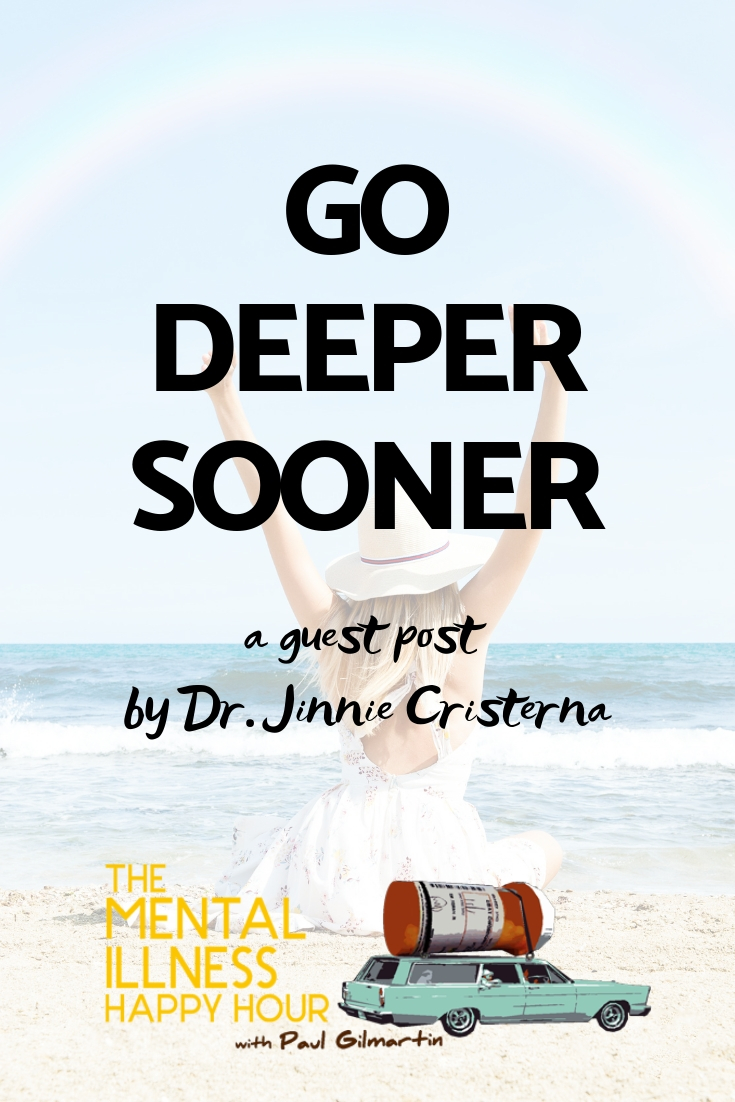Non-Traditional Therapies: Healing More Completely by Going Deeper Sooner
Join us for a guest post by Dr. Jinnie Cristerna. She discusses the benefits of non-traditional therapies, and the benefits of going deeper sooner for more complete healing.

This is a post in our Guest Bloggers series. All opinions are those of the author. Please consult a professional for medical advice
Healing More Completely by Going Deeper Sooner
Although a significant number of people benefit from traditional psychotherapy and/or psychoanalysis, it’s not uncommon for some of them to still feel the lull or pull towards the “issue(s)” that initially moved them to begin therapy long after their treatment is ‘finished’.
For many, it can feel like the itch you can’t scratch that becomes irritating over time. Since we all are ever changing, growing, and evolving, it is difficult to really be ‘finished’ with therapy. While therapy can help us heal some emotional wounds and learn how to navigate the everyday journey of life in healthier ways, it can feel incomplete if we are looking to explore more than our minds.
Those who want to go further than traditional therapy has taken them, look for ways to foster a deeper connection with and understanding of who they are. By connecting with and exploring their heart, soul, and body they can gain even more insight make connections that were once elusive.
But what if the mind wasn’t the sole focus of healing? What if people began their healing by exploring the mind, body, and soul connection to their problems or symptoms simultaneously? Would they be able to affect sustainable growth over a shorter period of time? I believe so.
It has been my experience that if you incorporate an artful balance of clinical and non-traditional therapy into treatment, you are able to go deeper sooner, gain more clarity, and see a reduction in symptomology. Results also tend to be more sustainable because you develop various tools to help you maintain your resilience and progress over time.
You may be wondering how this process works and it’s pretty straightforward: you by-pass the conscious mind and its defenses and go as close to the source of the what has caused the symptoms. The most effective way to get to the root of the symptom is to begin with the strongest emotion that is experienced when the symptom arises. By doing so, you are able to access the holy psychological trinity: Thought, emotion, and behavior. Failure to address all three leads to the feeling that something has been unaddressed.
Below are some answers to the most common questions people have about non-traditional therapy and how it can help you to go deeper sooner.
Will you heal faster by going deeper sooner with non-traditional therapies? Find out, here. Share on XWhat is traditional psychotherapy?
Traditional psychotherapy is therapy is considered talk therapy or mind to mind. In essence, the patient sits in a chair or on a couch and talks about their challenges with a therapist. It is often referred to as mind to mind therapy because most of the focus is on identifying patterns of thought, emotion or behaviors that are disruptive, unhealthy, or problematic.
On the other hand, psychoanalysis delves into the unconscious mind via free-association in a hyper-oxygenated therapeutic environment several times a week. While this is very effective and can bring about deeper awareness and healing, it may not be practical for most people.
What are non-traditional psycho-therapies?
Non-traditional psychotherapies can include an individual’s spirituality, higher self, soul, or religious beliefs. However, what sets it apart from traditional talk therapy is that the source of the emotional disruption is accessed by by-passing the patient’s psychological defense mechanisms. This allows the patient to see for themselves what is happening in their inner world which begins to re-create itself in the patient’s life.
Is it unhealthy to go deeper sooner? Are there any risks?
This is a legitimate question and the answer is: sometimes.
If an individual is very fragmented, does not have a grasp on reality, or does not have a healthy ego that is capable of looking at and coming back to itself, they may not be ready for non-traditional therapy. If an individual is not ready, non-traditional therapy may be limited in its effectiveness at best or can cause more fragmentation or depersonalization.
This is why an evaluation by a seasoned clinical therapist should be conducted before engaging in non-traditional therapies. Ensuring that one will not lose themselves in quackery or magical thinking is important before attempting to go deep is required to ensure the risks of worsening symptoms is minimized.
Are non-traditional therapies safe?
When the patient has been adequately prepared to undergo treatment in the care of an artful practitioner, non-traditional therapies are very safe and effective. It is not surprising to hear of people who have either had a significant reduction in symptom(s) after one session or complete treatment.
Who is a good candidate for non-traditional therapy?
The best candidate for non-traditional therapy is someone who is introspective, curious and in touch with reality. They have a healthy sense of who they are and personal responsibility.
What are some non-traditional therapies?
There are many non-traditional therapies that offer amazing results! The ones I am about to share compliment psychotherapy and psychoanalysis very well:
Heart Centered Hypnotherapy:
A wonderful single session therapy that helps you get to the essence of an issue by starting with the feeling. You identify the faulty thought and behavior that is at the core of your issue and replace it with a new conclusion and behavior of your choice during the session. This treatment also teaches you how to resource yourself during the session and can be used whenever you need outside of the session.
Past Life Regression Therapy:
While there are a lot of options for past life regression, I am referring to past life regression therapy. The focus is on understanding how you came to think, feel, or behave in a certain manner. Some people think of past lives as a part of their unconscious inner world, others see it as a creative metaphor about their life, and certain people believe they have lived before and are reincarnated to learn lessons they may have missed in another life. Regardless, past life therapy is a tool to help gain clarity and healing.
Yhandi’s Inner Light:
This is one of my favorite therapies to perform as it is brilliant inner child healing. It takes the patient deep inside to identify the maze that the child has created to keep itself safe from the world and what seeks to harm it. There is also an inner adult that exists who has created patterns of behavior and thoughts reflected in the client’s actual life. When these two are healed, they learn how to work together to help the client create a life that is practical, adventurous and meaningful. Yhandi’s Inner Light works in the unconscious mind and incorporates inner child work, psychotherapy, and mini-psychoanalysis in one treatment.
RoHun:
As a RoHun doctor I must disclose that this is absolutely my most favorite therapy! This is psychoanalysis and psychological surgery at its best. It is a clean sweep of each chakra or main energy center that helps the patient do two things 1) identify and release ways in which they are a victim and 2) identify how they abuse themselves and others and heal the parts of themselves that cause great damage in their own life.
How do I find a non-traditional therapist?
Word of mouth is the best way. You can also google the non-traditional treatment modality you would like to try and see who shows up in the search. You want to call and meet with them before you let them work on you because you both need to feel comfortable and safe working with each other. Also, check to make sure they are licensed clinical practitioners when you call them.
Should I still use a clinical therapist?
I strongly encourage you to find someone who does both traditional and non-traditional therapy. They often refer to their work as integrative mental health or holistic health/healing. If you are unable to find someone that meets these criteria, secure a therapist you can work with while you are working with a non-traditional therapist. This will help you integrate and get the most out of your work.



No Comments